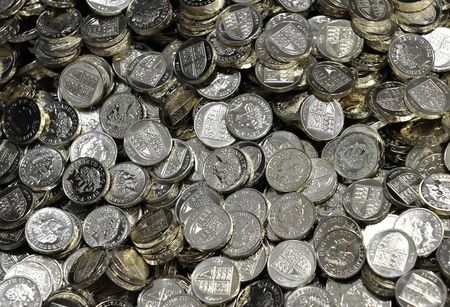By Anirban Nag and Patrick Graham
LONDON (Reuters) - Sterling fell around half a percent against a stronger dollar on Wednesday after Bank of England minutes showed policymakers were firmly against raising interest rates when they met earlier this month.
While two members voted to raise interest rates, most of the Monetary Policy Committee's nine members saw "few signs" of inflation pressures building, indicating that the debate within the committee for tighter monetary policy was losing some steam.
The minutes also showed members were concerned that Britain's output gap would be slightly larger than previously estimated and saw downside risks from the euro zone to a durable recovery.
The overall effect was to weaken sterling, although there was little or no shift in money market pricing and the pound recovered some ground later in the day, particularly against a weakened euro.
"Sterling losses after the BoE minutes may prove temporary going into retail sales on Thursday and GDP on Friday," said Valentin Marinov, head of G10 currency strategy with U.S. bank Citi in London.
"The minutes did not trigger a significant correction in short sterling market with investors still looking for Q3 2015 for the start of the hiking cycle."
By late afternoon in London, sterling had shed 0.45 percent to trade at $1.6042, above a day's low of $1.6012 hit immediately after the minutes. It was flat on the day at 78.93 pence per euro.
Doubts over the solidity of Britain's recovery and a pushing back of expectations for the timing of a first rise in interest rates have dominated the past few weeks for sterling.
But the economy remains one of the best growing in Europe and odds are still that there will be a growing premium for holding the pound over the next couple of years.
Gross domestic product numbers on Friday may turn attention back to that, although other indicators of growth -- including one private sector survey of retail sales for September -- have been more bearish.
Official data on the latter is due on Thursday.
"We already know that the retail numbers for September are unlikely to be great," said a dealer with one London bank. "The good weather clearly made people wait with buying their winter clothes. That's a seasonal thing but it should weigh on the ONS figures as well."

The consensus forecast of analysts polled by Reuters is for 2.8 percent year on year growth in spending by British consumers. The economy is expected to have grown by 3.0 percent in annual terms in the third quarter.
(Editing by Catherine Evans)
